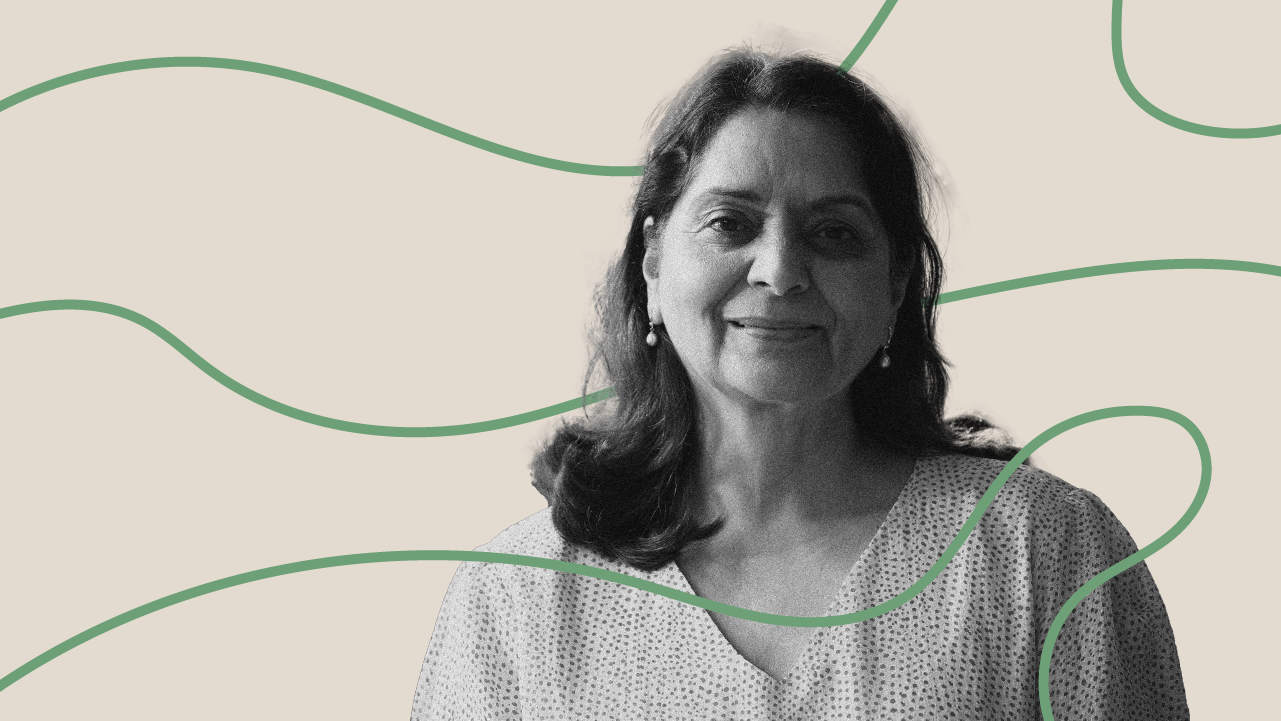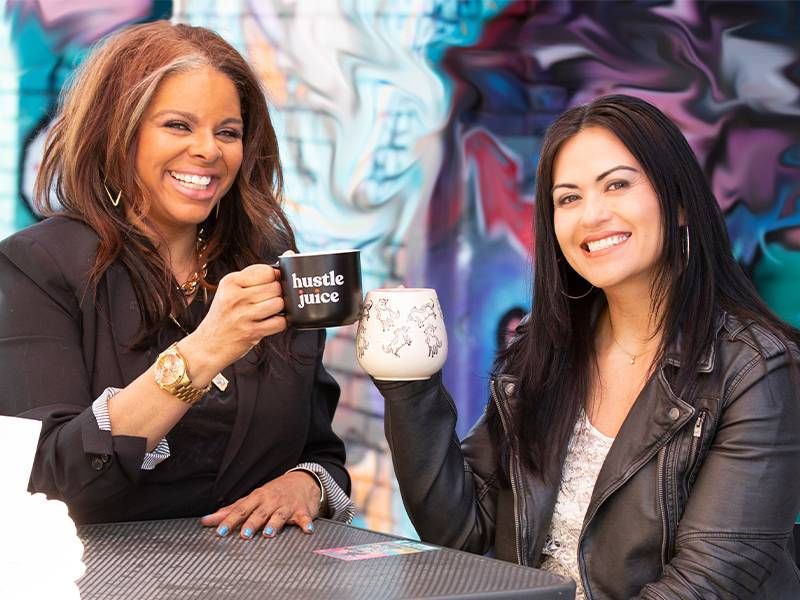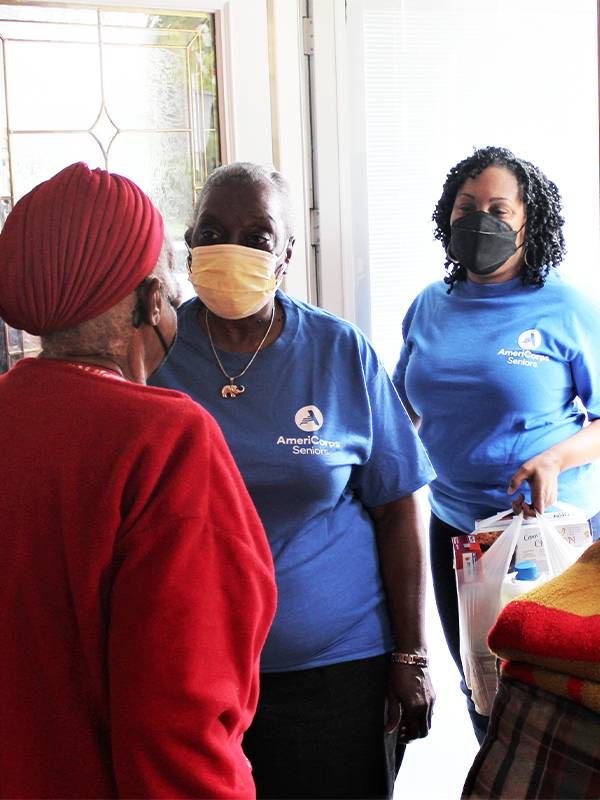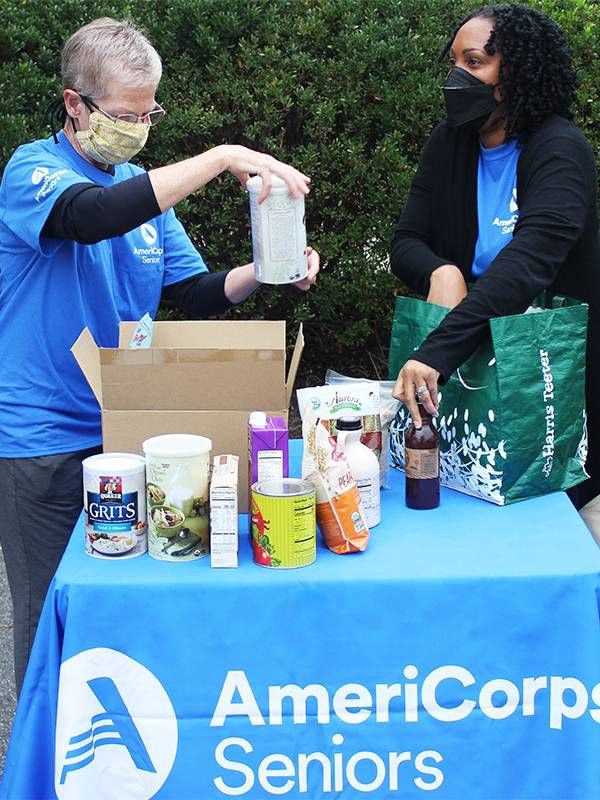Finding Work and Purpose
SecondActWomen's Barbara Brooks and Guadalupe Hirt and AmeriCorps Seniors' Atalaya Sergi help older Americans follow their passions

Record numbers of Americans have quit their jobs over the past year in what's been dubbed "The Great Resignation" (4.4 million in September alone, representing 3% of the U.S. workforce). Many — to the surprise of some analysts — have been people 50+, often looking for meaning and purpose through entrepreneurship, career switching and even early retirement. The number of self-employed workers has grown to 9.44 million, up 6% since before the pandemic, according to The Wall Street Journal.
"Society says we're over the hill. We say we're at the top of the hill. Corporate says we're too old for a do-over. We say we're just getting started."
Sharon Moshavi, president of the International Center for Journalists, wrote in a McKinsey & Company report that she expects this development to continue in 2022, which she says will be "the year of the worker." Said Moshavi: "The Great Resignation will swell, as more workers rethink their career trajectory and more companies struggle to bring employees back to the office."
Think of it as a "life's too short" moment.
At the same time, the raging pandemic has led hundreds of thousands of older adults to volunteer, often virtually, helping others in need. In many cases, these generous souls have come to the aid of fellow older Americans by helping them get vaccinated, seeing they're well-nourished and offering companionship to combat loneliness and isolation.
The SecondActWomen Women
This trend of finding work and purpose later in life, is why SecondActWomen co-founders Barbara Brooks and Guadalupe Hirt and the federal government's AmeriCorps Seniors National Director Atalaya Sergi are among the Next Avenue 2021 Influencers in Aging honorees. (Interviews with the three women follow.)
Dynamic Denver-based entrepreneurs Brooks, 55, and Hirt (known as Lupe), 48, founded SecondActWomen in 2018 to boost women 40+ and 50+ —what the duo calls middlescence — by offering them advice and support to start businesses and succeed in corporate jobs. The company's tagline: "Society says we're over the hill. We say we're at the top of the hill. Corporate says we're too old for a do-over. We say we're just getting started."
Age 44 "is the sweet spot for starting a company," said Hirt. "It's the great combination of experience, tenure and contacts."
"I knew that gender ageism was a problem and we needed to do something about it."
A particular emphasis for SecondActWomen: assisting women of color in midlife. Brooks jokes that she and Hirt are "quadruple minorities" because she's Black, Hirt's Latina, they're both women and Brooks is 5'11.
Before SecondActWomen, Brooks spent decades as an award-winning marketing and business development employee; Hirt was a public relations entrepreneur, documentary maker and copywriter. Three years ago, both struggled to get corporate jobs because of their age, which was the lightbulb that lit their partnership.
"I knew that gender ageism was a problem and we needed to do something about it. How the mission came about was me finding a solution for not only me, but my sisters," said Brooks, who calls herself "a corporate leftover." She adds: "SecondActWomen was born out of fear, but also a gut instinct that it was time."
In the past year, SecondActWomen held the successful Biz&LifeCon work, life and money summit in Denver; took steps to turn their enterprise global; created a business directory and were one of 31 businesses chosen to be part of Facebook's community accelerator program ("a game changer" for the company, Brooks said). Coming up: a podcast and an aging conference focused on the state of women.
The Americorps Seniors National Director
In January 2021, Atalaya Sergi, who's in her 40s, took the helm of AmeriCorps Seniors, a division of the government's AmeriCorps national service program. The former social worker, school counselor and vice president, strategic partnerships and programming at the JumpStart for Young Children nonprofit, now runs AmeriCorps Seniors' three programs for its roughly 200,000 volunteers age 55 and older: Foster Grandparents, Senior Companions and the biggest one, RSVP (Retired and Senior Volunteer Program), all founded in the 1960s.
While at JumpStart in Los Angeles, Sergi learned about AmeriCorps Seniors Foster Grandparents program, where people 55+ support young victims of abuse as well as mentor and care for kids with disabilities.
AmeriCorps Seniors — overwhelmingly female — not only help the needy, they often find improvements in their own health.
"I really started to understand the power of older adults and intergenerational programming," she said.
The Senior Companions program provides independent living support to other older adults and RSVP volunteers do everything from tutoring to disaster preparedness to tax preparation to serving military families to resettling refugees. Foster Grandparents and Senior Companions volunteers are low-income older adults who receive a modest stipend.
Lately, the former Encore Public Voices Fellow has found her AmeriCorps Seniors work especially urgent, when so many Americans have been hurting and needing help to stay healthy during COVID-19 and at a time when volunteering has become harder due to social distancing rules.
On her plate: divvying out up to $4 million for volunteer programs from the Biden administration's American Rescue Plan, including helping kids get back to school.
Sergi said her agency's research has shown that AmeriCorps Seniors — overwhelmingly female — not only help the needy, they often find improvements in their own health, becoming less depressed and feeling more connected than those who don't volunteer regularly.
Barbara Brooks and Guadalupe Hirt
Next Avenue: Barbara, when you spoke to Next Avenue for an earlier article, you said that when you were fifty-one and looking for a corporate job, hiring managers didn't even give you a chance. Why?
Barbara Brooks: I left corporate America in 2011 and became an accidental entrepreneur and fast forward to 2018, I was trying to get back into corporate America. And the hiccup was I couldn't get hired.

Getting the 'Dear Jane' emails, when you read through them, you can actually pick out the code words — 'culture fit' or 'over experience.' You'd pick up on all those things that said: 'You know, they just don't want you.'
And also the fact that we're always pigeonholed as not wanting to learn more. That we're not tech savvy. It's BS.
That's when I decided I really needed work on something that could be unique to women, not even recognizing that it would be specific to middlescence women. I knew that gender ageism was a problem and we needed to do something about it.
And Lupe, were you hearing the same sort of things?
Guadalupe Hirt: It's almost as if they are dismissing the legacy, knowledge and experiences that we have. I had been an entrepreneur for twenty-four years and I was trying to get into corporate. Through my experience as an associate producer and an author and entrepreneur, I thought: 'I've got skills that would be desired by anyone.
I said [to Barbara], 'Girl, you know what? I'm hitting a wall here. I think I'm supposed to be on the entrepreneurial scene again.'
And you've both found that other women in midlife have been hitting the same barriers in corporate America that you did?
Hirt: As we talked to women that were in the same shoes that we were in then, we're finding that they find themselves trying to push back on those biases.
Brooks: One of the problems for ladies that are still on the job that we hear from, they're feeling undervalued, they're feeling invisible, unheard. They're feeling uninvited. And so, what's happening is they're coming out of corporate because they're deciding to create their own career within their own company and be their own boss.
"One of the problems for ladies that are still on the job that we hear from, they're feeling undervalued, they're feeling invisible, unheard."
They're coming out injured, in a sense — internally injured. And so, a lot of what we do is to lift them back up.
Hirt: Ageism is the one 'ism' that affects everybody regardless of socioeconomic status, religion, gender, whatever. It's a true equalizer.
Do you find that women and people of color in their forties, fifties, sixties who want to start a business run into the same kind of resistance from investors and lenders that happens at corporations?
Hirt: We're finding that we've got a couple of 'isms' to counter against. Obviously sexism, and then you've got racism potentially, too. You look at the VC [venture capital] stats of investment in women-owned businesses — it's only between two and three percent. You drop the women of color card in there and then we're talking like less than one percent.
Have you seen anything related to your audience that has excited you because of what's been happening in the pandemic?
Brooks: There are women who have been a part of the 'Great Resignation' and who said: 'Oh, I am discovering there's life out there. There is life after corporate America!' Or that there is more to life than going to work ten hours a day and coming into emails on the weekend and working their butts off. Instead, resigning from that position and finding a new position to live their desired worklife.
But also, pre-pandemic there were twelve hundred and twenty businesses a day started by women over forty. You can just imagine how many they're starting now, with the 'Great Reset.'
So, now, they're coming out saying: 'Not only do I not need corporate America any longer, but it is time for me to design my life and create my mission and purpose in life.'
Hirt: Women adapt and swivel.
Obviously, this is a tough time for a lot of women — specifically women over forty. We accounted for the largest percentage of unemployment rates during the pandemic; women were being furloughed in great numbers. There was obviously genuine despair.
And we saw women rise from the ashes to understand and adapt.
And it was beautiful because we say: within darkness, there's light. And I think now we're seeing a resurgence in our community of women, whether it's starting their own businesses or expanding their businesses or going back into corporate and defining their roles a little bit more.
"A lot of the women have told us they have never felt more resilient, nor did they realize how resilient they were."
Brooks: A lot of the women have told us they have never felt more resilient, nor did they realize how resilient they were. They realize how much grit they have, how much curiosity they have for what's next. And they have a new love of life.
Any final advice for people thinking about becoming midlife entrepreneurs?
Brooks: I say: Go with your gut and do it. I say: You're unstoppable and you can. Or as Oprah likes to say: 'I can. I will. Watch me.' And that's what we want to do: We want to watch you. Because you can.
Hirt: Don't compromise.
Brooks: And can I say? — Find that friend or that family member who will support you.
Hirt: It makes a world of difference.
Brooks: It makes a world of difference. We all need support.
Two Questions About Aging for Barbara Brooks and Guadalupe Hirt
If you could change one thing about aging in America, what would it be?
We would challenge the private and public sectors to add ageism to their DEI (diversity, equity and inclusion) agenda, adopt more age-inclusive practices and build intergenerational teams rooted in mutual respect, understanding and collaboration. Currently, only 8% of companies with DEI initiatives include age, yet ageism is the one "ism" that can impact everyone.
How has the COVID-19 pandemic changed your perspective on aging?
COVID-19 has revealed the inequities, biases and challenges that continue to keep women 40- and 50-plus on the periphery. It also revealed their grit, resilience, persistence and character. From the Great Resignation to the Gray Hair revolution, we're calling for the Great Reset with women 40- and 50-plus leading the charge.
Atalaya Sergi
Next Avenue: Why did you want to run AmeriCorps Seniors?
Atalaya Sergi: I think the thing that really captured my attention was the impact that I saw. It's a really exciting area to work in — to think about how national service and volunteerism can provide solutions to problems in our communities and about new models of service.
Older adults are such a resource. I think that service can be one way to really activate them in our society and across our country… AmeriCorps Seniors' RSVP program has really done well in the past to help the resettlement of refugees. So, we're going to be called to do that again.

What have you seen happening among older adults volunteering during the pandemic?
All of our programs have really been able to respond to COVID-19.
A lot of the stories that we see in the news were around seniors' vulnerability and fragility in the face of COVID-19. There weren't as many stories about how our seniors were continuing to serve their community. They may not have been able to go to the food bank, but they organized and trained younger people who could; they delivered food to doorsteps.
They did contact tracing calls and called to do wellness checks on people who were home. The AmeriCorps Seniors were having so much more success in their [contact tracing] calls, they ended up doing training for the younger people.
We recently launched two programs out on the west coast that are engaging retired medical professionals and lay people to continue the efforts around COVID-19 vaccinations and education.
Fifty percent of our grantees are in education and serving children. They really pivoted during COVID to find ways to continue to support children and families and teachers. A lot of our programs purchased tablets so older adults could engage virtually.
We knew that kids were socially isolated and older adults were socially isolated. So, this was an opportunity to reduce that social isolation and anxiety for both ends of our age spectrum. That was really exciting for our volunteers, because all of our programs are meant to be done in person.
Some of our programs launched new initiatives. When there was funding for small businesses — the Paycheck Protection Programs and things like that — some of our programs that had worked in tax preparation or benefits navigation launched new opportunities to help small businesses apply for that funding.
You've said that engaging older Americans in service is a win-win all around. What do you mean by that?
When older adults engage in service, they bring so much lived experience and prior knowledge to that service, in addition to a desire to leave their community better. They have the opportunity to not only meet the need that they're assigned to, but they have the opportunity to mentor younger people, to mentor those of us in our middle ages and encourage us to follow their example. Almost like creating that pipeline of volunteers that will come after.
"A lot of our programs purchased tablets so older adults could engage virtually."
How hard has it been for the AmeriCorps Seniors volunteers to do what they do in the pandemic because of lockdowns and restrictions and health issues? And how hard is it today for any older person to be performing some sort of service given the health situation we're in?
It has been a real challenge, because they were the most vulnerable; that was figured out really early on. And so they really had to think about their health and safety, and we did as well. That was where our programs really started to innovate and to look for other ways to remain in service in their communities.
It was difficult and it's still difficult. We did lose volunteers during the pandemic to things like having to be the one to stay home with children and having to take care of friends and family who were homebound. And also just to hesitancy.
Schools, in particular, are still very hesitant around volunteers. So, some of our programs have had difficulty getting volunteers back into schools. But they are trying to use virtual means to do that. We do think that virtual service is a way that we kept a lot of our volunteers in service.
We hope that as the nation gets vaccinated, we can get [more older Americans] back into service. A couple of colleagues from New York have talked about the number of food banks and thrift stores that have closed because older adults were the ones who, before the pandemic, had been volunteering and keeping those organizations open.
I think it imperative that we continue to push forward as a country to move out of the pandemic and to get every older adult we can back into service.
What do you say to older Americans who say 'I would love to be a volunteer and be helpful, but I just don't think I can do it right now because of the pandemic'? Are they right?
I would say: Think differently.
Think about all the options there are to volunteer that are still very safe and consider programs that can give you those options. We have people who are still delivering food, but they're delivering that to the front porch. They're not going in. We had our tax preparation volunteers start to answer questions either over the phone or virtually.

I would say: Don't give up. Keep looking. Keep asking, 'How can I do this safely?'
One of our previous Influences in aging, Ken Dychtwald from AgeWave, is disappointed that more retired Americans aren't volunteering. He says only a quarter of retirees have volunteered over the past decade. What's your view about this and why do you think more older American retirees aren't volunteering?
One of the things that I wonder about from his data is how they asked about volunteering. There was an AARP survey years ago, where they thought that African American older adults didn't volunteer. But they didn't call it volunteering; they were serving their community.
I would say my parents are a prime example. If you ask them, do they volunteer? They would both say no. However, there is an older lady they met at church who my stepmother takes her meals to every week. She takes her to her doctor's appointments and she does her grocery shopping for her. My father has done many improvements around her house to make sure that she is safe. If I asked them if they volunteered, they would say 'No, that is just what they do for people in their community.'
Even so, a lot of older adults don't volunteer. Do you think that's because they don't know where they can be useful or how to do it? Is it because they feel they can't afford to do it?
It may be that people don't know where they can volunteer or the multiple ways they could volunteer. One of the things I've seen in surveys of older adults is they want to continue to use the skills they have and sometimes they don't know how those skills can be used in volunteering.
I think we need to perhaps work with companies and nonprofits to ask people: As a part of your retirement planning, how are you going to volunteer in your community? What are you going to do?
The AmeriCorps web page lists all of the AmeriCorps Seniors programs and their locations. So someone might be able to find an AmeriCorps seniors program that they can volunteer with. The other thing I would say is if there is a place you have an interest in, go ask them how you can volunteer with them.
Is there anything that would get help get more older Americans to volunteer?
Providing some opportunities for stipends or for reimbursements for costs would help some people to be able to volunteer instead of having to maybe work extra hours somewhere.
I think that if there was a way to give some type of benefit — like on their taxes — for people who volunteer X number of hours a year, that would be a way to help.
Maybe even before people retire, to get them connected into a volunteer organization. And incentivizing that in the workplace would get people already in the mindset, already connected to organizations which may help people to continue that as they go into retirement.
If we suddenly saw many more older people volunteering that we're seeing today, what would that look like?
I think maybe that would allow us to address a lot of our problems that we have in the country, to support education, public health, veterans and military families.
Having more older adults serve would also remove some of the biases and ageism that we have in our country. Seeing older adults in a different light would change people's attitudes about that.
Two Questions About Aging for Atalaya Sergi
If you could change one thing about aging in America, what would it be?
Shift the narrative of aging. We should embrace aging and value older Americans. With aging comes deeper knowledge and lived experiences, which are used daily by older Americans to drive our economy, ensure our community-based organizations, reach those in need and help our communities bring critical solutions to pressing challenges
How has the COVID-19 pandemic changed your perspective on aging?
It highlighted the resiliency and determination of older Americans and reaffirmed that we must provide the resources and care they need with equity as our lens. Though older adults were at risk, some kept serving communities by helping in vaccination efforts, tutoring children, providing food security, becoming caregivers and more.


